|
How Does a Farmers Market Affect the Community?
Tomorrow the Kojo Nambe radio show on WAMU will interview Sharon Gruber of Bread for the City. Bread for the City is a DC based food bank with cutting edge ideas on food and nutrition for low income recipients. They “Glean” fresh food from farmers and farmers markets to distribute as a healthy alternative to the processed foods most food banks rely on. Their website states “Bread for the City rescues tens of thousands of pounds of fresh, free surplus produce. Gleaning is an ancient practice of salvaging food that would otherwise go to waste in a food system.” They glean from farmers, farmers markets and trees in the DC area. It is a novel and creative method of procuring food for distribution to low income families. (1) Since Bread for the City provides a range of services including health care, it was important to them to support their health care initiative by providing fresh healthy foods for their customer base. Statistically it can be difficult to identify how the distribution of fresh food affects the habits of a community. Fortunately, in January 2008, The American Journal of Public Health published an article by four doctors who completed an in-depth, statistical analysis of the long term practices of low-income women who received assistance for the purchase of fresh local fruits and vegetables. This was a two month study conducted in Los Angeles, using scientific methodology which documented reactions of a control group to economic subsidies for fresh fruits and vegetables. These doctors wanted to know if access to fresh foods at a good price could change eating habits – and it did! Prior to this study, there were few quantitative studies on the effect on daily habits access to fresh foods might create. Kaiser Permanent did a small survey of patrons at their worksite farmers markets and discovered that nearly 3 of 4 shoppers reported that they consumed at least a few more fruits and veggies because of the market and more than half reported consuming an increased variety of fruits and veggies.(2) According to the American Journal for Public Health article, people with low incomes are at risk for poor dietary quality and for low consumption of fruits and vegetables. There are many factors that contribute, the chief among them being the lack of green grocers, supermarkets or farmers markets in low income neighborhoods, as well as the cost of fresh foods and veggies compared to the low cost of high sugar, high carbohydrate foods like potatoes, pasta, and rice. The doctors conducting the study provided two things to promote the choice of fresh vegetables and fruits: 1. economic subsidies for fresh fruits and veggies in the form of SNAP coupons, and 2. they made sure there was a farmers market and/or grocery store within walking distance of the SNAP offices. When you get into the middle of the article there are enough equations, percentages and statistics to give you a headache, so let me synthesize. Access to an economic subsidy for fresh fruits and veggies, as well as a site to purchase them in, resulted in a large increase in consumption of fruits and vegetables during the study and afterwards as well. “Farmers Market Participants showed an increase of 1.4 servings…” (complicated math – let’s just say it means people were eating fresh food at nearly every meal), while the “supermarket participants showed an increase of 0.8 servings.” “Participants redeemed more than 90% of the coupons and purchased a wide variety of fresh fruits and vegetables” Clearly people who frequented farmers markets were more likely to eat more fruits and veggies. This is probably because farmers markets are more fun than grocery stores. We don’t need a complicated scientific study to prove it, however this study states “farmers’ market participants thought produce at their site was fresher and of higher quality than at the supermarket”. Participants who purchased their produce at the farmers’ market also mentioned enjoying the pleasant “community experience” of meeting friends while shopping and interacting directly with growers. (3) Presently Bread for the City gleans at our market. We have a great relationship and love to see the truck drive up every week to haul off the goods. We support their efforts to promote healthy eating wholeheartedly. Our own efforts at promoting healthy eating are diverse: We have a wide range of foods at our market; we have had a Yoga class at the market and may offer more, we give away recipes, our operating non-profit Eden Good dedicated the summer to demonstrating how to can the fresh produce shown at our market, the Alexandria biking initiative has had a table at our market multiple Sundays, we will watch customers bikes for them if they bike to the market. Additionally, we are looking into adding the SNAP program, coupons for low income residents, to our market next season. If anyone reading this would like to assist with that research and planning, please contact us at [email protected]. Please listen to the Kojo Nambe Show this Wednesday at 1PM to hear Sharon Gruber, Bread for the City’s nutritionist, talk about their work. This Sunday - come and say hi and tell us your stories on how the market has affected your eating habits. I will add them to our blog. See you at the market! (1) Bread for the City Website. www.breadforthecity.org (2) Project for Public Spaces ”Public Markets and Community Health: An Examination” J. Robin Moon, Dr. M. Katherine Kraft, Dr. Lawrence Brown, Jarmin Yeh. (3) “Effect of a Targeted Subsidy on Intake of Fruits and Vegetables Among Low-Income Women in the Special Supplemental Nutrition Program for Women, Infants, and Children.” Denar R. Herman, Gail G. Harrison, Abdelmonem A. Affi, and Eloise Jenks. American Journal of Public Health. January 2008, Vol 98, No. 1. Enes Yigit is the soft-spoken and kind individual cutting lemons and squeezing them fresh onsite at the West End Farmers Market. Based in Alexandria, their fresh juices have been sold at Eastern Market and the Turkish Festival in D.C. Made from whole fruit and sometimes served with fresh mint (no color or syrups), their product is all natural.
This Saturday at the Unitarian Universalist Church in Arlington the documentary "Farmadeddon" will be shown at 11:30AM. Afterwards there will be a panel discussion about the issues raised in the movie about the troubles small farms are experiencing. Your $15.00 donation will be given to FarmFoodFreedom.org to lobby the FDA on behalf of consumers
For those of you who are die-hard local-food foodies some of the information presented in the documentary might be old news. For others the idea that the USDA has been over-zealous in harassing small farms might be a rather nasty surprise. As Andrew O'Hehir of Salon.com states in his July 8 blog: "Activists, farmers and foodies make the case (in the documentary) for locally grown and minimally processed food, and we hear a lot of anecdotes about governmental overreach, while the bureaucrats either damn themselves by keeping their mouths shut or damn themselves by talking and saying nothing. A Vermont family has its entire herd of imported sheep destroyed, thanks to a completely imaginary outbreak of mad-cow disease (which is not known to occur in sheep in the first place, and definitely didn't occur in theirs). Armed agents invade an upstate New York farm to seize a cooler full of raspberry yogurt. An undercover unit breaks up an interstate trafficking ring -- one devoted to bringing USDA-certified raw milk from South Carolina across the line into Georgia." Why the sudden rush to armed intervention to prevent raw milk from being drunk by consumers? Bureaucracy gone wild?, Stupidity? Pressure on the USDA by Agribusiness? We may never know for absolutely certain. In my opinion, at the very least, the differences between highly processed food factory farms run by corporate agribusiness and local farmers has caused a crisis in identification by the powers that be such as the USDA, and State and Local Health Departments. Here in Virginia, where they support farmers markets, the bureaucracy has difficulty sorting through the differences between agribusiness products and small farm products. They tend to utilize the same rules for both, when in fact regulations that recognize the difference between Agribusiness Products and Small or Sustainable Farm Products has become essential. This documentary is about the moment in time when this concept is still being articulated and lobbied for. As in all moments of change - problems are occurring. But it is possible for people to sway the laws in their favor, lobby their congresspeople, write letters, buy locally grown foods. If you like your free-range eggs, hormone free chickens, and even raw milk - go see the documentary, and donate your money towards the work of re-describing what healthy food is, where it comes, how it is stored, and take a look at a moment in time, just before everything either facist-like stubbornly stays the same or serendipitously changes drastically. For more information on these issues go to: http://grassfedonthehill.com/about-grassfed-on-the-hill Yesterday's event was fantastic! The weather was wonderful, a great turnout and there was indeed lots of laughter. Fruit, flowers and face painting. Veggies, vases and video recording. Yogurt and yoga. Herbs, handmade goods and henna. Baked good, balloon twisting, bicycles, babies and bubbles. Meat, milk and magic. Lemonade and laughter.
What did you like most?  Ted has been involved with woodworking most of his life, but really got into it about eight years ago after he retired - making things for his grandchildren in his garage. He sold some items at the Eldercrafter shop in Old Town Alexandria for a time. That evolved into an expanded product line and selling at farmer’s markets. Ted take pride in producing high quality hand crafted items (still working in his garage) and enjoy selling what he can at local farmer’s markets in Maryland and Northern Virginia. Ever wonder who runs the West End Farmers Market? We have a wonderful group of dedicated volunteers who help with the administration, weekly set-up and clean-up, event planning, marketing and communications, accounting, and anything else that needs to be done.
|
West End Farmers Market
|
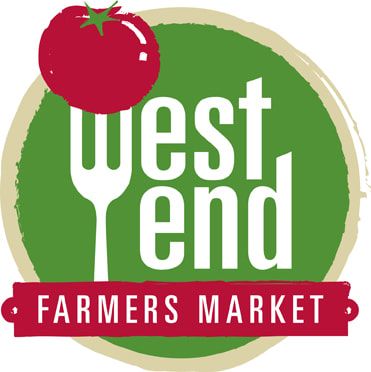
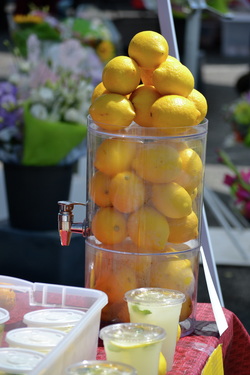
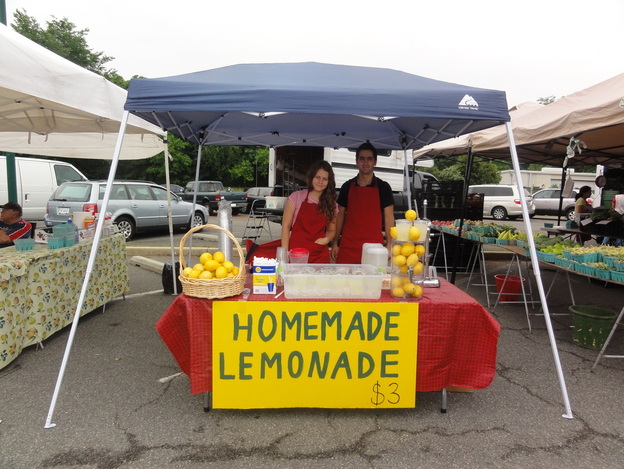
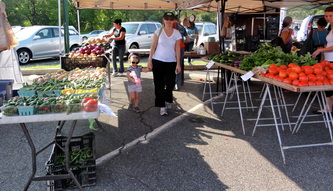
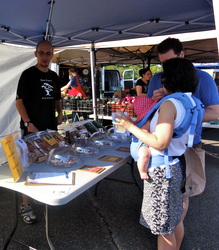
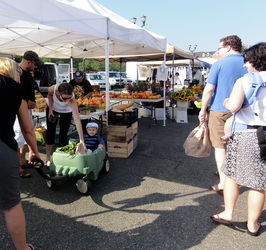
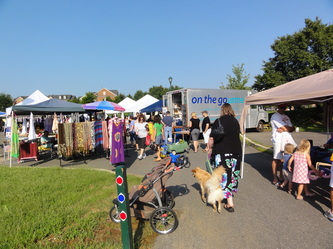
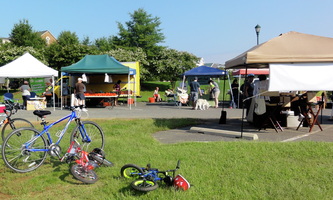


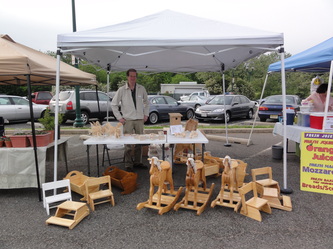
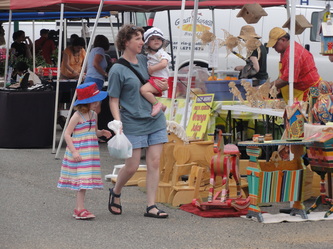










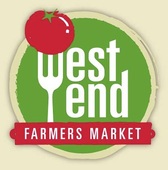
 RSS Feed
RSS Feed
